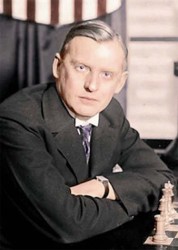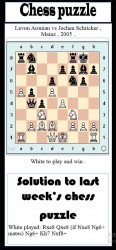Perhaps an inspiring way to begin the New Year is to focus on one of the finest chess attackers of all time, Dr Alexander Alekhine, (Moscow 1892-Estoril, Portugal 1946). Alekhine was an undisputed attacking genius, and is still widely admired to this day for his prowess to create startling chess combinations. Garry Kasparov, for instance, noted that he benefited considerably from studying Alekhine’s games and the ideas behind his combinations. Unquestionably, Alekhine made chess beautiful.
He took the World Championship title from Capablanca in 1927 when the Cuban was considered unbeatable. However, Alekhine lost the title to the Dutchman Dr Max Euwe in 1935. The loss was blamed on his heavy drinking. Akekhine was shocked at his loss and went into intensive training for a return championship match. In 1937, he crushed Euwe 10:4, and held the title until his death. For his return match, in the absence of computers, Alekhine memorized every game that Euwe had played which was recorded! Alekhine was immodestly sure of the superiority of his play. He described it concisely in his own words: “To win against me, you must beat me three times: in the opening, the middle game, and the ending.” He was versatile, and extremely dangerous on the chessboard.
 Here is the 4th game of his World Championship match against Dr Euwe in 1935.
Here is the 4th game of his World Championship match against Dr Euwe in 1935.
Euwe, Max v Alekhine, Alexander
The comments are by Kasparov.
d4 Nf6 2. c4 g6 3. Nc3 d5 4. Qb3 dxc4 5. Qxc4 Bg7 6. Bf4 c6 7. Rd1 Qa5 8. Bd2 b5 9. Qb3 b4 10. Na4 Na6 11. e3 Be6 12. Qc2 O-O 13. b3 Rab8. Black’s opening would have been cursed by the founders of the classical school. A backward pawn on c6, developed but uncoordinated pieces, lack of control in the centre. Naturally Alekhine was aware of these factors, but he was betting on the hidden dynamism of Black’s position. The complexity of comparing positional qualities and tactical potential makes it very difficult, even for the strongest players, to evaluate the risk they are undertaking. But the readiness to remain at the cutting edge can be amply rewarded if the opponent misses the crucial moment of the explosion! 14. Bd3 Rfc8 15. Ne2 c5 16. Bxa6 Qxa6 17. Nxc5 Qb5 18. Nf4 Bg4 19. f3 e5 20. Nfd3 exd4 21. fxg4 dxe3 22. Bxe3 Nxg4 23. Bf4 Bc3+ 24. Rd2 Rxc5 25. Nxc5 Qxc5 26. Bxb8 Qe7+ 27. Kd1 Ne3+ 28. Kc1 Nxc2 29. Rxc2 h5 30. Rd1 Bg7 31. h3 a5 32. Bf4 Qe4 33. Bc7 Qe3+ 34. Kb1 a4 35. bxa4 b3 36. axb3 Qxb3+ 37. Kc1 Bh6+ 38. Rdd2 Qxa4 39. Be5 Kh7 40. Bc3 Qb5 41. Bd4 Qe2 42. g4 Qe1+ 43. Kb2 Bxd2 44. Rc8 Bc1+ 0-1.

Chess Game
US grandmaster Hikaru Nakamura opposed his Azerbaijan counterpart Levon Aronian in a US$100,000 friendly chess match in November. The four game match ended in a draw, but Nakamura won the blitz encounter thereby winning the match. Here are three games from the classical series.
Nakamura v Aronian
White: Hikaru Nakamura
Black: Levon Aronian
1. d4 Nf6 2. c4 e6 3. Nf3 d5 4. Nc3 Bb4 5. Bd2 O-O 6. e3 Re8 7. a3 Bf8 8. Rc1 Nbd7 9. Be2 a6 10. c5 c6 11. Na4 Ne4 12. O-O Nxd2 13. Nxd2 e5 14. e4 dxe4 15. Nxe4 Qh4 16. f3 exd4 17. Bc4 Nf6 18. Nb6 Rb8 19. Nxc8 Rbxc8 20. Qxd4 Nxe4 21. fxe4 Rc7 22. Rce1 Rd8 23. Qe3 Qh6 24. b4 Qxe3+ 25. Rxe3 Rd4 26. Bb3 g6 27. Ref3 Rdd7 28. e5 Re7 29. e6 h5 30. Rf6 Kg7 31. h4 a5 32. R1f3 axb4 33. axb4 Kh7 34. Bc2 Kg7 35. exf7 Rxf7 36. Rxg6+ Kh8 37. Rfg3 Bg7 38. R3g5 Rf4 39. Rxh5+ Kg8 40. Bf5 Kf8 41. Be6 Ke8 42. g3 Rxb4 43. Kg2 Rb2+ 44. Kh3 Kd8 45. Rhg5 Bc3 46. Rg8+ Ke7 47. Bc4 Rf2 48. Rh5 1-0.
Aronian v Nakamura
White: Levon Aronian
Black: Hikaru Nakamura
 1. c4 e6 2. g3 d5 3. Bg2 Nf6 4. Nf3 Be7 5. O-O O-O 6. d4 dxc4 7. Ne5 Nc6 8. Bxc6 bxc6 9. Nxc6 Qe8 10. Nxe7+ Qxe7 11. Na3 c5 12. dxc5 Qxc5 13. Be3 Qb4 14. Qc1 Ba6 15. Bd4 Rfd8 16. Rd1 Rac8 17. Qc3 Qa4 18. Qc2 Qxc2 19. Nxc2 c3 20. Bxc3 Rxd1+ 21. Rxd1 Bxe2 22. Re1 Bc4 23. Ne3 Nd5 24. Nxc4 Rxc4 25. Bd2 Kf8 26. Rc1 Rxc1+ 27. Bxc1 Ke7 28. Kf1 e5 29. Ke2 e4 30. Kd2 f5 31. Kc2 Nb4+ 32. Kb3 Nd3 33. Be3 a6 34. Kc3 Kd6 35. h4 g6 36. b4 Kd5 37. a4 Ne5 38. b5 a5 39. Bb6 Nc4 40. Bd8 Kc5 41. Bc7 h5 42. Kc2 Kd5 43. Kb3 Nd2+ 44. Kc3 e3 45. fxe3 Ne4+ 46. Kb2 Nc5 47. Bxa5 Nxa4+ 48. Ka3 Nc5 49. Bb4 Nb7 50. Ka4 1-0.
1. c4 e6 2. g3 d5 3. Bg2 Nf6 4. Nf3 Be7 5. O-O O-O 6. d4 dxc4 7. Ne5 Nc6 8. Bxc6 bxc6 9. Nxc6 Qe8 10. Nxe7+ Qxe7 11. Na3 c5 12. dxc5 Qxc5 13. Be3 Qb4 14. Qc1 Ba6 15. Bd4 Rfd8 16. Rd1 Rac8 17. Qc3 Qa4 18. Qc2 Qxc2 19. Nxc2 c3 20. Bxc3 Rxd1+ 21. Rxd1 Bxe2 22. Re1 Bc4 23. Ne3 Nd5 24. Nxc4 Rxc4 25. Bd2 Kf8 26. Rc1 Rxc1+ 27. Bxc1 Ke7 28. Kf1 e5 29. Ke2 e4 30. Kd2 f5 31. Kc2 Nb4+ 32. Kb3 Nd3 33. Be3 a6 34. Kc3 Kd6 35. h4 g6 36. b4 Kd5 37. a4 Ne5 38. b5 a5 39. Bb6 Nc4 40. Bd8 Kc5 41. Bc7 h5 42. Kc2 Kd5 43. Kb3 Nd2+ 44. Kc3 e3 45. fxe3 Ne4+ 46. Kb2 Nc5 47. Bxa5 Nxa4+ 48. Ka3 Nc5 49. Bb4 Nb7 50. Ka4 1-0.
Aronian v Nakamura
White: Levon Aronian
Black: Hikaru Nakamura
1. c4 e6 2. g3 d5 3. Bg2 Nf6 4. Nf3 Be7 5. O-O O-O 6. d4 dxc4 7. Qc2 b5 8. a4 b4 9. Nfd2 c6 10. Nxc4 Qxd4 11. Rd1 Qc5 12. Nbd2 Ba6 13. b3 Nbd7 14. Bb2 Rad8 15. Rac1 Nb6 16. Bxf6 gxf6 17. Ne4 Qf5 18. Nxb6 axb6 19. Qxc6 Rxd1+ 20. Rxd1 Rc8 21. Qxb6 Bxe2 22. Qb7 Bxd1 23. Qxc8+ Bf8 24. Qd8 Bxb3 25. a5 Kg7 26. a6 Qe5 27. h4 Bd5 28. Nxf6 Qxf6 29. Qxf6+ Kxf6 30. Bxd5 Bc5 1/2-1/2.





